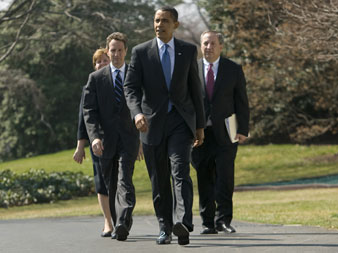 AP ImagesPresident Obama leads his economic team to the South Lawn of the White House, March 18,2009, to make a statement on AIG.
AP ImagesPresident Obama leads his economic team to the South Lawn of the White House, March 18,2009, to make a statement on AIG.
Robert Scheer is the editor of Truthdig, where this article originally appeared. His latest book is The Pornography of Power: How Defense Hawks Hijacked 9/11 and Weakened America(Twelve).
Bernie Sanders, the senator from Vermont who is independent in spirit as well as party label, has placed a hold on President Obama’s nomination of Gary Gensler to head the Commodity Futures Trading Commission. Sounds like a minor issue to get worked up about, but the senator is right. Like most Americans, I am eager for Barack Obama to succeed, but I see this appointment as further evidence that the president has entrusted his economic policy to the wrong people.
Gensler helped create this financial crisis when he was in the Treasury Department back in the Clinton era, when bipartisan cooperation with Wall Street lobbyists was all the rage. Sanders gets right to the point: “Mr. Gensler worked with Senator Phil Gramm and Alan Greenspan to exempt credit default swaps from regulation, which led to the collapse of AIG and has resulted in the largest taxpayer bailout in US history.”
Sanders’ hold will not stop the Gensler nomination, because Congress and the president, recognizing the nation’s mood, want to give Wall Street whatever it wants to make the stock market go up. And Gensler is a reassuring figure to the moguls of finance; he was a partner at Goldman Sachs before being brought by Goldman honcho Robert Rubin to the Clinton Treasury Department.
After Rubin left to take a $20-million-a-year job at Citigroup, which he helped run into the ground, Lawrence Summers, his protege and replacement at Treasury, elevated Gensler to be an undersecretary. Gensler then performed as Summers’ point man in advocating for deregulation legislation that enabled the current debacle.
The explosion of toxic assets is a direct result of the laws pushed through by Rubin and his followers, and in the decade since, we have had a twenty-fold increase, to more than $530 trillion, in the value of those newfangled financial instruments, which Warren Buffett in February 2003 correctly termed “financial weapons of mass destruction.”
Yet when one member of the Clinton administration, Brooksley Born, then head of the Commodity Futures Trading Commission, attempted to sound a warning, she was treated by the rest of Clinton’s economic team as the enemy.
Popular
"swipe left below to view more authors"Swipe →
In response to Born’s warning, they drove her from government and pushed through the Commodity Futures Modernization Act, which summarily exempted from regulation the derivatives that now haunt us. The claim at the time by Summers, now top economic adviser in the Obama White House, was that “[t]his legislation promotes innovation and competition in the U.S. financial markets and may help to reduce systemic risk.” Of course now we know, as Born predicted, that it did quite the opposite. What irony that Gensler is being rewarded with Born’s old job for getting it wrong.
In congressional testimony supporting the radical deregulation of the financial derivatives market, Gensler had insisted with great enthusiasm that “OTC derivatives directly and indirectly support higher investment and growth in living standards in the United States and around the world.” As to the many trillions of dollars in credit swaps that now afflict the world economy, Gensler specifically called for freeing swaps of this kind from existing government regulation in the Commodity Exchange Act, which regulated other futures such as wheat sales. He said, “…[S]wap transactions should not be regulated under the CEA. …”
His key argument, and that of Summers as well, was that even raising the prospect of regulating what have proved to be toxic derivatives would deny these financial instruments the “legal certainty” they needed to thrive. What a loss that would be, warned Summers, who called the financial derivatives market “a powerful symbol of the kind of innovation and technology that has made the American financial system as strong as it is today.”
So “they”–Summers, Gensler, Treasury Secretary Timothy Geithner and their ueber mentor, Rubin–were as wrong as anyone could be. Perhaps such error is human, but aren’t there folks out there with a better prospect of getting it right that Obama can rely on?
A great deal is at stake, and we are being asked to support the president’s plans as a matter of trust in a hopeful new leader. But the latest administration plan, announced by Geithner on Monday, seems to be more of the same. We taxpayers are being asked to buy back from the banks the very toxic assets that the members of Obama’s economic team once celebrated as an unmitigated blessing. Only this time, instead of trusting the banks, we will turn over control, but little risk, to hedge funds that are totally unregulated. Here we go again.


